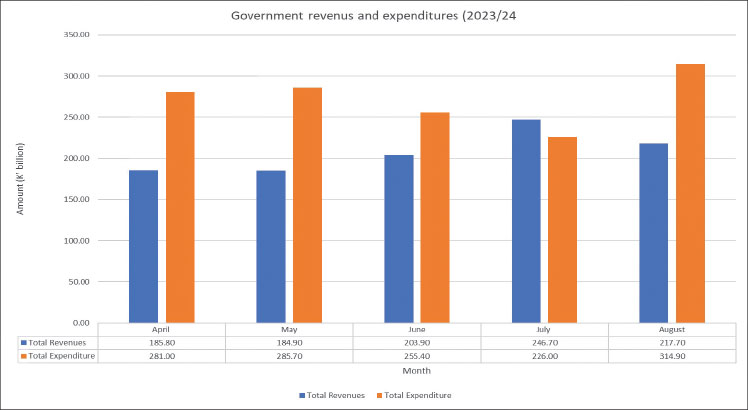Treasury in K324bn budget deficit
Five months into the 2023/24 financial year, government has recorded a K324 billion deficit, prompting economists to urge strong measures to contain the budget gap and free up space for social spending.
Data from the Reserve Bank of Malawi (RBM) shows that in the first five months of the budget implementation, government spent K1.36 trillion against revenue of K1.039 trillion.
In April, government collected K185.8 billion while expenditures stood at K281 billion, representing a deficit of K95 billion. The following month, the deficit grew to K100.8 billion due to a drop in revenue to K184.9 billion and a corresponding increase in expenditure to K285.7 billion.
The government closed the first quarter with a narrowed deficit of K51.5 billion following a drop in expenditures to K255.4 billion and a simultaneous increase in revenue to K203.9 billion. In July, the government collected K246.7 billion against an expenditure of K226 billion, representing a surplus of K20.7 billion.

In August, government expenditures rose to K314.9 billion against a collected revenue of K217.7 billion, representing a deficit of K97.2 billion.
From April to August this year, the government collected K867 billion in domestic revenue, with K818.30 in tax revenue and K48 billion in non-tax revenue, while grants contributed a further K172 billion to the national purse.
In an interview on Tuesday, Lilongwe University of Agriculture and Natural Resources agriculture economist Christopher Mbukwa said he expects the deficit at the end of the 2023/24 financial to be within range.
He, however, expressed concern with the growing debt interest payments, saying they are crowding out spending in the education and health sectors.
Economic analyst Bond Mtembezeka said it was important for the government to prioritise its expenditures on budget lines and expenses that are sustainable and impactful.
“What is paramount is to ensure that much of the funds that are borrowed to fund deficits are self-liquidating funds, sustainable and are deployed in productive sectors of the economy.”
Catholic University of Malawi economics lecturer Greenson Nyirenda said the rising interest payments are taking away funding from development projects that would “have generated future resources for the provision of services in the country”.
However, economist Milward Tobias, who has expressed interest to stand for the presidency in 2025, cautioned against reading too much into the figures in terms of budget deficits.





